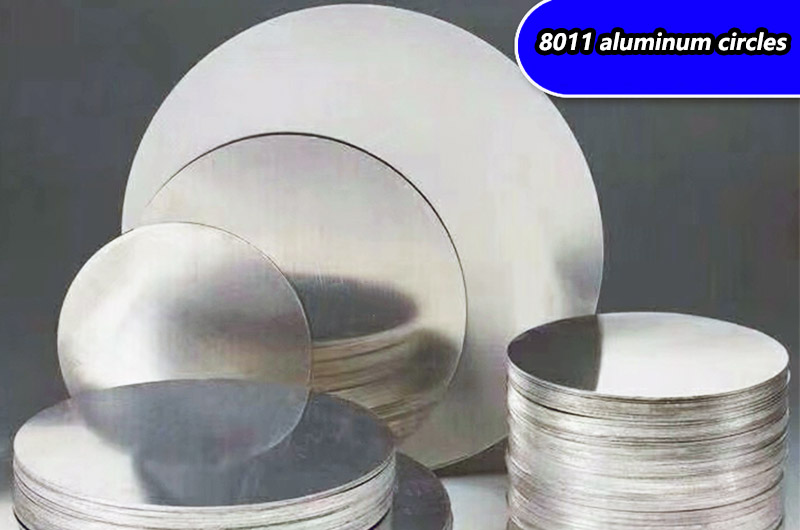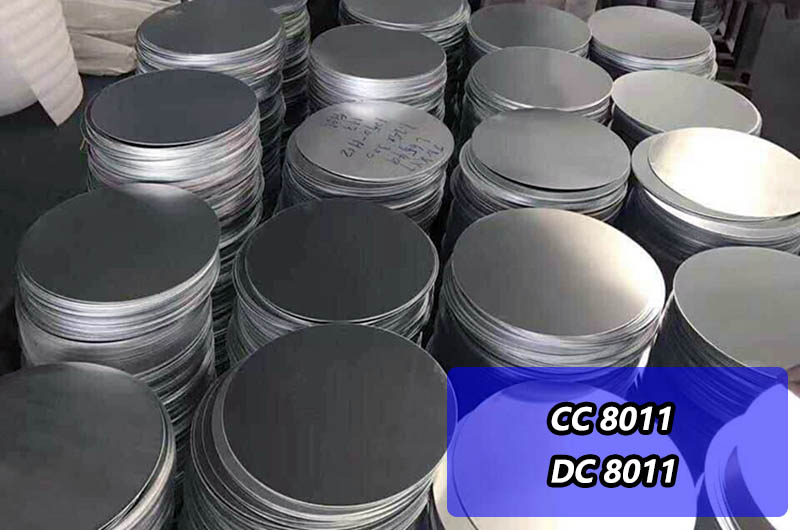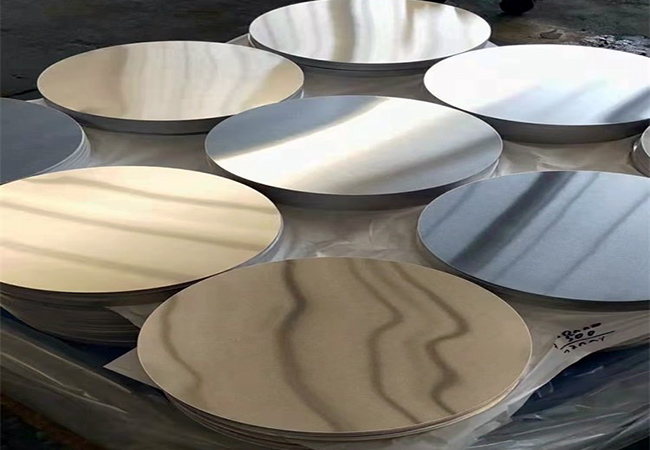- Basic Introduction to 8011 Aluminum Disc Circle
- Specifications Of 8011 Aluminum Circles
- Quality Control of 8011 Aluminum Discs
- Chemical and Physical Properties
- 8011 Aluminum Disc Circles Surface Treatment
- 8011 Aluminum Disc Circles Advantages and Disadvantages
- 8011 Aluminum Disc Circles Applications
- 8011 Aluminum Disc Process
- 8011 Aluminum Disc Temper Correspondences and Alternatives
- When to Choose 8011 Aluminum Disc
Aluminum, one of the most versatile and widely used metals, finds its way into various industrial and everyday applications. Among the many aluminum alloys available, 8011 aluminum stands out for its exceptional qualities, making it a prime choice for manufacturing aluminum disc circles.
8011 aluminum circles are flexible enough to bend without breaking. 8xxx series aluminum is typically processed into foil, but can also be processed into aluminum plates.

Basic Introduction to 8011 Aluminum Disc Circle
8011 aluminum is an alloy primarily composed of aluminum with added elements to enhance its properties. The 8011 aluminum disc circle is a specific form of this alloy, meticulously shaped into circular discs.
These discs are renowned for their remarkable qualities and serve as essential components in various industries. Let's begin our exploration by looking at the chemical and physical properties of 8011 aluminum.
Specifications Of 8011 Aluminum Circles
- Alloy: CC8011/DC8011
- Diameter: 80mm up
- Thickness: 0.3mm up Sizes: 8 - 36" with 20, 19, 18, 16, 14, 12 & 10 Gauge We offer two types of quality i.e Spinning Quality & Pressing Quality
Quality Control of 8011 Aluminum Discs
Haomei Aluminum can provide CC and DC 8011 aluminum circles, which can be used for product composition analysis, mechanical property analysis, metallographic analysis, environmental simulation, heat resistance test, test analysis, corrosion analysis, engineering and other tests.
The 8011 aluminum discs produced by Haomei Aluminum have good deep drawing properties, good tensile properties, clean oil removal, few holes, good product shape, high surface cleanliness, no oil stains, no black wires and bright lines and foreign matter inclusions, and their performance is stable , cutting without deformation and other multiple advantages.

Chemical and Physical Properties
8011 Aluminum Disc Circle Chemical Composition
The 8011 aluminum alloy consists primarily of aluminum, with additional elements such as iron (Fe), silicon (Si), copper (Cu), manganese (Mn), magnesium (Mg), and trace amounts of other elements. The exact composition can vary slightly depending on the manufacturer and intended use.
| Alloy | 8011 |
|---|---|
| Si | 0.50-0.90 |
| Fe | 0.6-1.0 |
| Cu | 0.1 |
| Mn | 0.2 |
| Mg | 0.05 |
| Cr | 0.05 |
| Zn | 0.1 |
| Ti | 0.08 |
| Others:Each | 0.05 |
| Others:Total | 0.15 |
| Al:Min. | remainder |
8011 Aluminum Disc Circle Physical Properties
Density
8011 aluminum has a relatively low density, making it lightweight and easy to handle. The density of aluminum is approximately 2.7 g/cm³.
Melting Point
The melting point of 8011 aluminum is around 660.3°C (1220.54°F), which is relatively low compared to many other metals.
Tensile Strength
This alloy offers excellent tensile strength, making it suitable for applications requiring durability and resistance to external forces.
Electrical Conductivity
8011 aluminum is an excellent conductor of electricity, making it valuable in electrical applications.
Corrosion Resistance
Aluminum has natural corrosion resistance due to the formation of a protective oxide layer on its surface, which is especially beneficial in outdoor or corrosive environments.
Machinability
8011 aluminum is easy to machine and form, allowing for a wide range of manufacturing processes.
Now that we've covered the chemical and physical properties, let's explore the surface treatment options available for 8011 aluminum disc circles.
8011 Aluminum Disc Circles Surface Treatment
The surface treatment of 8011 aluminum disc circles can further enhance their properties, appearance, and longevity. Some common surface treatments include:
8011 Anodized Aluminum Disc Circles
Anodized 8011 aluminum disc circles are more resistant to corrosion and wear, making them suitable for outdoor applications such as signage and cookware.
8011 Polished Aluminum Disc Circles
Polishing can give the discs a shiny and reflective finish, making them ideal for decorative and aesthetic purposes, such as mirror frames.
8011 Coating/Painted Aluminum Disc Circles
Coating or painting can provide a protective layer, enhance aesthetics, and allow for customization in various colors and finishes.
8011 Embossed Aluminum Disc Circles
Embossed patterns can be added to the surface for decorative purposes or to improve grip, making them suitable for applications like cookware and non-slip flooring.
Laser Etching
Laser etching can be used for precise marking or branding of the discs and is often seen in the electronics and automotive industries.
The choice of surface treatment depends on the specific requirements of the application.

8011 Aluminum Disc Circles Advantages and Disadvantages
8011 aluminum disc circles offer several advantages that make them an attractive choice in various industries:
8011 Aluminum Disc Circles Advantages
Excellent Formability: 8011 aluminum is highly malleable and can be easily formed into the desired shape, making it suitable for a wide range of applications.
Corrosion Resistance: The natural oxide layer on the surface provides resistance to corrosion, extending the lifespan of the product.
Lightweight: Its low density makes 8011 aluminum disc circles lightweight, which is advantageous for transportation and handling.
Good Thermal Conductivity: The alloy's high thermal conductivity is useful in applications where heat dissipation is crucial.
Recyclability: Aluminum is fully recyclable, contributing to sustainability and environmental conservation.
However, it's essential to consider potential disadvantages:
Disadvantages of 8011 Aluminum Disc Circles
Lower Strength Compared to Some Alloys: While 8011 aluminum is strong, there are other aluminum alloys with higher strength, which may be preferable for specific applications.
Price: The cost of 8011 aluminum may be higher compared to other metals, but its advantages often justify the expense.
Limited High-Temperature Use: Aluminum has limitations in high-temperature applications due to its lower melting point.
With the advantages and disadvantages in mind, let's explore the diverse applications of 8011 aluminum disc circles.
8011 Aluminum Disc Circles Applications
8011 aluminum discs have excellent anodizing effects and can be used to make high-grade pearl anodized cookware.
8011 aluminum disc circles find application across numerous industries, thanks to their versatile properties. Here are some examples:
1. 8011 Aluminum Disc Circles for Cookware
Use Case: 8011 aluminum disc circles are widely used for manufacturing cookware, such as pans, pots, and woks.
Temper: Typically, the temper used in cookware is H14 or H24 for improved formability and durability.
2. 8011 Aluminum Disc Circles for Signage
Use Case: The lightweight and corrosion-resistant nature of 8011 aluminum makes it suitable for outdoor signage.
Temper: H18 temper is often used for extra strength and rigidity.
3. 8011 Aluminum Disc Circles for Electronics
Use Case: In electronics, 8011 aluminum disc circles are used for cases and enclosures.
Temper: H32 temper is commonly used for its balance of strength and formability.
4. 8011 Aluminum Disc Circles for Automotive
Use Case: These discs are employed in various automotive components, such as wheel covers and fuel tanks.
Temper: H18 and H24 are often used for strength and resistance to corrosion.
5. 8011 Aluminum Disc Circles for Lighting
Use Case: 8011 aluminum discs are utilized for lampshades and reflective components in lighting fixtures.
Temper: H19 is commonly used for improved strength and formability.
6. 8011 Aluminum Disc Circles for Reflectors
Use Case: The high reflectivity of aluminum makes 8011 discs suitable for reflectors in lighting and solar applications.
Temper: H24 temper is a popular choice.
7. 8011 Aluminum Disc Circles for Utensils
Use Case: 8011 aluminum discs are used in the production of various kitchen utensils, including trays, plates, and bowls.
Temper: H12 or H14 temper is typically used for ease of forming.
8. 8011 Aluminum Disc Circles for Traffic Signs
Use Case: The durability and high visibility of 8011 aluminum make it ideal for manufacturing traffic signs.
Temper: H18 temper is commonly employed for increased strength.
9. 8011 Aluminum Disc Circles for Architecture
Use Case: In the construction industry, 8011 aluminum disc circles find application in architectural elements such as decorative panels and cladding.
Temper: H14 temper is often used for its combination of formability and strength.
10. 8011 Aluminum Disc Circles for HVAC (Heating, Ventilation, and Air Conditioning)
Use Case: These discs are used in HVAC systems for diffusers and air supply components.
Temper: H32 temper is commonly chosen for its balance of properties.
8011 Aluminum Disc Process
- Uncoiler
- Storage machine
- Tension straightener
- Acid and alkali cleaning machine
- Wash with water
- conversion processing
- Primer
- Infrared curing oven
- Main coater
- Flotation solidification furnace
- Film stripping machine
- Export storage machine
- Winder
- punching
- Aluminum disc
8011 Aluminum Disc Temper Correspondences and Alternatives
The choice of temper for 8011 aluminum disc circles is vital, as it influences their properties and suitability for specific applications. Here are some common tempers and their corresponding applications:
H12 and H14: These tempers are suitable for applications requiring excellent formability, such as cookware and utensils.
H18: H18 temper is often used for high-stress applications like traffic signs and automotive components.
H24 and H32: These tempers offer a balance of strength and formability, making them versatile choices for a wide range of applications, including cookware, signage, and HVAC components.
H19: H19 temper is chosen for applications demanding both strength and formability, such as lighting components.
When considering alternatives to 8011 aluminum disc circles, one must look for alloys with similar or better properties, depending on the specific application. Some potential alternatives include:
3003 Aluminum Discs: These discs are an alternative for cookware, signage, and utensils, offering good formability and corrosion resistance.
5052 Aluminum Discs: With higher strength and excellent corrosion resistance, these discs are suitable for automotive and marine applications.
6061 Aluminum Discs: Known for their exceptional strength, 6061 discs are often used in aerospace and structural components.
3004 Aluminum Discs: These discs offer good formability and corrosion resistance and are suitable for applications similar to 8011 aluminum in the cooking and packaging industries.
When to Choose 8011 Aluminum Disc
The decision to choose 8011 aluminum disc circles should consider the specific requirements of the application. 8011 aluminum is an excellent choice when:
1. Formability is Essential
If your application requires deep drawing, spinning, or extensive forming, 8011 aluminum offers excellent formability.
2. Corrosion Resistance is Vital
In outdoor or high-moisture environments, the natural corrosion resistance of 8011 aluminum is a significant advantage.
3. Lightweight Material is Preferred
When weight savings are a priority, 8011 aluminum's low density is beneficial.
4. Electrical Conductivity is Required
In electrical applications, 8011 aluminum's high electrical conductivity is a valuable property.
5. Recyclability Matters
If sustainability and recyclability are important, 8011 aluminum is a responsible choice.
In conclusion, 8011 aluminum disc circles are versatile components used in a wide array of applications across various industries. Their exceptional properties, including formability, corrosion resistance, and lightweight nature, make them a top choice for many manufacturers.
By understanding their chemical and physical properties, surface treatment options, advantages, disadvantages, and applications, you can make informed decisions about when and how to use 8011 aluminum disc circles.
Additionally, knowing the temper correspondences and potential alternatives allows for greater flexibility and optimization in different scenarios. Whether you are in the cookware, signage, electronics, automotive, or any other industry, 8011 aluminum disc circles prove to be a reliable and adaptable material for your needs.
